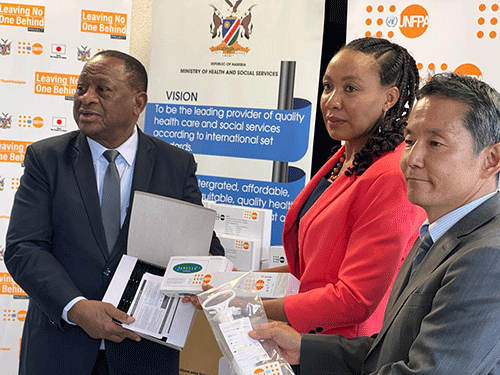The Japanese government has donated health supplies to Namibia, consisting of interventions for Covid-19, contraceptives and reproductive kits.
The most recent donation was valued at US$463 000 and was facilitated through UNFPA, a United Nations sexual and reproductive health agency.
The donation was handed over by Japanese embassy charge d’affairs Sadamoto Noriaki, who said the Japanese pride themselves on many great values, founded on principles of humanity and brotherhood.
“We are very excited to work with the Namibian government and other stakeholders, including UN agencies, to help people meet their development challenges,’’ said Noriaki.
“As we are on a recovery from the aftermath of the unprecedented pandemic, it is increasingly necessary for the international community to strengthen cooperation in order to overcome the cries together and to promote human security for all,’’ Noriaki stated.
The Japanese donation comes at a time when rates of adolescent girls using contraceptives are decreasing and the rates of teenage pregnancies at an alarming 15 000 pregnancies per year.
Kavango West has been slated as the region with the highest percentage of teenage pregnancies in Namibia.
This region is followed by Kunene, with the lowest numbers coming from Khomas.
Teenage pregnancies have a catastrophic impact on the youth, as it disrupts education, increase the number of young people infected with STDs, escalates injuries during birth due to undeveloped bodies, increases depression after birth and encourage illegal terminations.
The Japanese health project further focuses on those farthest left behind, including vulnerable women and girls, particularly those living with disabilities, pregnant and lactating women, in and out of school youth, and other groups susceptible to sexual and gender-based violence.
Meanwhile, Japan has also contributed to other related projects in health sectors, such as mitigating the impact of multiple emergencies on protection, health, nutrition and learning outcomes for women and children in vulnerable communities.
For this, the Japanese government budgeted US$750 000 through the World Health Organisation.
In addition, as an emergency response, Japan has also committed US$1.6 million for the procurement of cold-chain equipment for Covid vaccines and capacity -building assistance in promoting vaccination in Namibia.
At the donation handover, health minister Dr Kalumbi Shangula said Namibia’s long-standing partnership with Japan has been beneficial in many ways, dating back to pre-independence.
‘’The availability of safe and accessible contraceptives and other health products is one of the most important areas for investments in public health. This is because it is important to ensure that women and girls are provided with choices relating to reproductive health,’’ said Shangula.
Moreover, UNFPA officer Loide Amkongo shared her worries about the decreasing rates of adolescent girls using contraceptives.
Sharing how the pandemic has affected 12 million women worldwide through a shortage of contraceptives, Amkongo said she was grateful for the country receiving over 6000 condoms, which she said would go a long way in preventing unwanted pregnancies and STDs.



